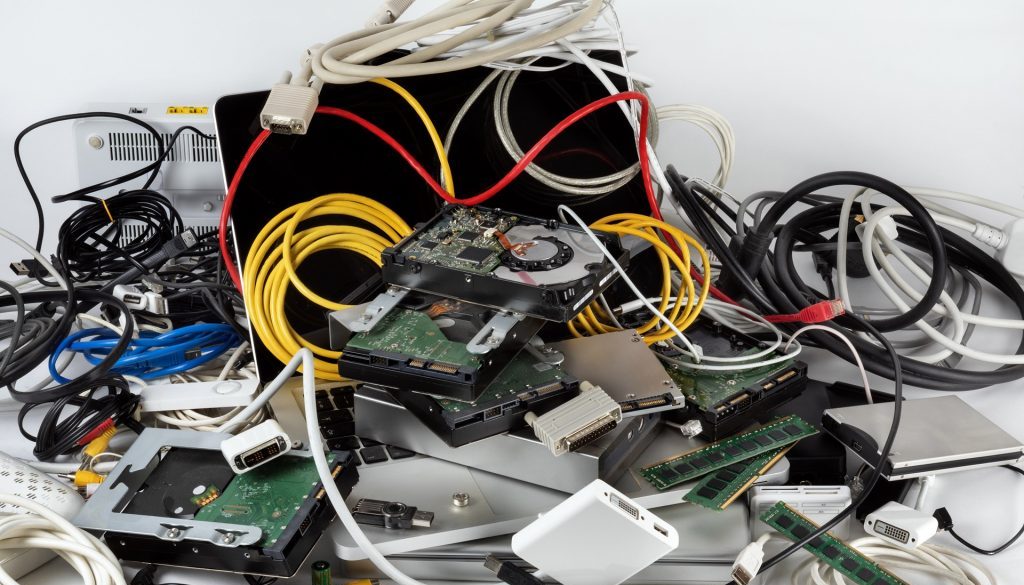The rapid advancement of technology in recent years has led to an ever-increasing amount of electronic waste or e-waste. Electronic waste refers to any discarded electrical or electronic devices, many of which contain hazardous materials that can negatively impact the environment and human health when not disposed of correctly.
In the United Kingdom, this issue is addressed through the Waste Electrical and Electronic Equipment (WEEE) regulations, which promote responsible management, recycling, and disposal of e-waste. As a family-run skip hire and aggregate company servicing Staffordshire, we are here to help our clients tackle the WEEE challenge by providing guidance and best practices for electronic waste disposal in compliance with regulations and environmental sustainability.
One of the main challenges regarding WEEE is the complexity and variety of materials found in electronic devices, including metals, plastics, glass, and chemical compounds. Many of these materials pose a risk to human health and the environment due to their hazardous properties, such as lead in cathode ray tube (CRT) monitors, mercury in flat-screen TVs, and brominated flame retardants in electrical devices. In addition, improper disposal of electronic waste can contribute to groundwater, air, and soil pollution, endangering the well-being of ecosystems and local communities.
To address this complex problem, it is crucial to raise awareness of WEEE and adopt best practices for electronic waste management and recycling. By fostering responsible disposal and recycling of electronic devices, we can all play our part in minimising harmful effects on the environment and human health.
In this article, we will explore key WEEE regulations, discuss the importance of recycling centres and drop-off locations, and outline best practices for individuals and businesses to manage electronic waste effectively. With the support of our expert waste management services, you can contribute to greener, more sustainable waste management practices in your community.
Tackling The WEEE Challenge: Best Practices for Electronic Waste Disposal
1. WEEE Regulations and Their Relevance
Understanding the Waste Electrical and Electronic Equipment (WEEE) regulations is crucial for individuals and businesses alike to manage electronic waste responsibly:
- Scope: The WEEE regulations apply to a wide range of electrical and electronic products, including household appliances, IT equipment, lighting equipment, and power tools.
- Producer Responsibility: Companies that manufacture or import electronic products must comply with the WEEE regulations, ensuring that they contribute to the cost of collection, treatment, and recycling of these devices.
- User Responsibility: End-users, including households and businesses, must dispose of WEEE correctly, using designated recycling facilities or authorised disposal methods.
Compliance with WEEE regulations promotes the responsible handling of electronic waste, reducing its negative impact on the environment and human health.
2. Importance of Recycling Centres and Drop-off Locations
Recycling centres and drop-off locations play a crucial role in the effective management of electronic waste, offering accessible and reliable disposal solutions:
- Proper Treatment: These facilities ensure that electronic waste is processed, treated, and recycled according to best practices and regulatory requirements.
- Pollution Prevention: By offering responsible disposal options, recycling centres help prevent improper handling and disposal of electronic waste in landfills, minimising pollution and associated health risks.
- Resource Recovery: Electronic devices contain valuable materials that can be recovered and reused. Recycling centres help conserve these resources by extracting and recycling them for future use.
3. Best Practices for Individuals in Electronic Waste Disposal
As end-users of electronic products, individuals can adopt best practices in electronic waste disposal, contributing to the protection of the environment and compliance with regulations:
- Separate WEEE from General Waste: Keep electronic waste separate from regular household rubbish, ensuring it is disposed of correctly and does not contaminate other waste streams.
- Use Designated Disposal Options: Take advantage of local recycling centres, drop-off locations, or retailer take-back schemes to dispose of your electronic waste responsibly.
- Donate or Repurpose: If your electronic device is still functional, consider donating it to a charity, school, or local community organisation for reuse, extending its life cycle and reducing waste.
4. Best Practices for Businesses in Electronic Waste Disposal
Businesses play a key role in managing electronic waste responsibly by adhering to WEEE regulations and adopting environmentally conscious practices:
- Implement A WEEE Disposal Policy: Develop a clear policy outlining procedures for the proper disposal of electronic waste according to regulatory guidelines and environmental best practices.
- Designated Collection Points: Establish dedicated collection points for electronic waste within the workplace, making it easy for employees to comply with the disposal policy.
- Partner with A Reputable Waste Management Company: Engage with a trusted waste management partner to provide guidance and services for managing electronic waste in compliance with WEEE regulations.
- Educate and Train Employees: Ensure employees understand the importance of proper electronic waste disposal and are aware of the company’s WEEE policy and procedures.
Conclusion
Managing electronic waste through responsible disposal and recycling practices is vital in addressing the growing WEEE challenge. By following best practices and adhering to WEEE regulations, individuals and businesses alike can contribute to the protection of the environment and human health.
At Enviro Skip Hire, our family-run skip hire and aggregate company, we are committed to providing expert guidance and waste management services to help our clients navigate the complexities of electronic waste disposal. If you require assistance with managing electronic waste or would like more information about our range of Hanley skip hire and services, please do not hesitate to contact us today.




